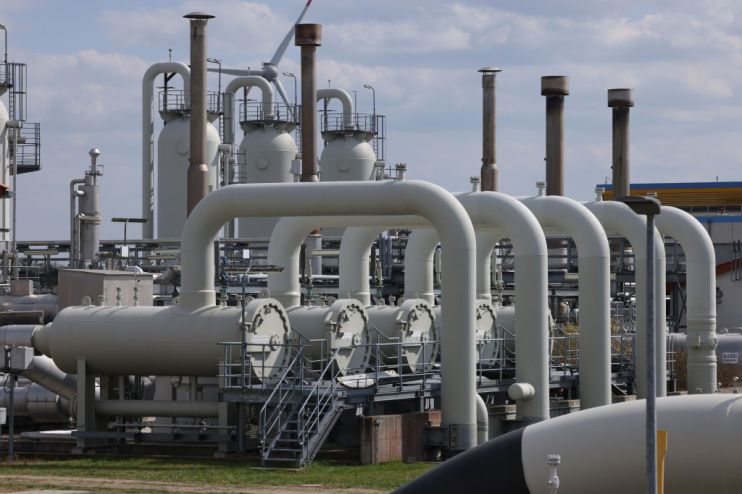EU in talks with Nigeria to replace Russian gas as UK aims to boost flows into troubled bloc

The European Union (EU) is in negotiations to buy gas from Nigeria as the bloc scrambles to secure supplies in case Russia turns off the taps ahead of winter.
Matthew Baldwin, deputy director general of the European Commission’s energy department, held meetings with officials from the country earlier this week.
Nigeria plans to re-open the Trans Niger pipeline after August, which would yield more gas exports to Europe.
The EU imports 14 per cent of its total liquefied natural gas (LNG) supplies from Nigeria – and Baldwin told news agency Reuters there is potential to more than double this,
Currently, oil and gas output in Nigeria is being throttled by theft and vandalism of pipelines, leaving gas producer Nigeria LNG terminal at Bonny Island operating at 60 per cent capacity.
However, the country is beefing up security in the Niger Delta region, which could see supply levels increase.
Baldwin said: “If we can get up to beyond 80 per cent, at that point, there might be additional LNG that could be available for spot cargoes to come to Europe. They (Nigerian officials) said to us, ‘Come and talk to us again at the end of August because we think we can deliver real progress on this’.”
Nigeria NLG is owned by state-oil company NNPC alongside energy giants Shell, TotalEnergies and Eni.
Last year, Nigeria exported 23bn cubic metres (bcm) of gas to the EU, but the figure has been declining over the years.
For context, in 2018 the bloc bought 36 bcm of LNG from Nigeria.
Russia puts the pressure on Europe as cold winter looms
The proposed boost in Nigerian gas flows reflects the urgency of Europe’s situation this winter.
Russia has cut off gas supplies into 12 EU member states, which refused to pay for gas supplies in roubles in line with new laws imposed by President Vladimir Putin.
The country has also cut gas flows via the key Nord Stream 1 pipeline 60 per cent over the past month, with volumes remaining reduced following ten days of maintenance.
The Kremlin has also warned Russia will not supply oil to countries that decide to impose a price cap on its oil in a bid to tame prices,
The moves are widely considered retaliation to Western sanctions following Russia’s invasion of Ukraine, such as plans to phase out seaborne oil shipments and coal imports.
Europe typically relies on Russia for around 40 per cent of its gas imports, with countries such as Germany and Austria relying on the country for half their supplies.
However, the shortfall from Russia has triggered emergency plans across the multiple EU member states, which could lead to rationing and redistribution of supplies this winter.
The International Energy Agency has warned that the bloc needs to ramp up storage capacity to 90 per cent ahead of winter in case Russia cuts of supplies.
The EU is currently pushing member states to ramp up storage to 80 per cent by October – with storage levels currently sitting at 65 per cent.
Its executive arm, the European Commission, has also called for countries to cut their gas usage 15 per cent from August to March.
The target would initially be voluntary, but would become mandatory if the commission declared an emergency.
In a sign of unease over the plans, this proposal is being contested by multiple member states, including Spain, Portugal and Greece – concerned about power cuts this winter and inflicting pain on households to protect countries with larger industrial bases.
Talks between diplomats, envoys and government officials over potential compromise measures are expected this coming week.
Spanish Energy Minister Teresa Ribera argued in a letter to the commission on Friday that Spain shared the final goal of the EU executive’s proposals, but believed there were more effective measures than a uniform and mandatory gas demand cut.
She said: “It is essential that the European response to this situation not be perceived as unfair and economically damaging for our citizens and industry,”
Meanwhile, the National Grid has asked for emergency permission to pump more gas to Europe as it races to fill up storage facilities ahead of a winter crunch.
Operators are ramping up the capacity of pipelines between the UK and the Netherlands to help boost stocks.
National Grid has applied to the Joint Office of Gas Transporters for permission to increase the pressure on the 235km pipeline between both countries, as first reported in The Telegraph, so the pipeline can export 34 per cent more than normal.
This follows a request from BBL, the Netherlands-based operator of the pipeline, to maximise gas exports to Address existing gas supply shortages across the continent.
The UK only gets around of its gas directly from Russia, but it is exposed to knock-on effects from European markets – with global disruptions elevating prices on domestic benchmarks.